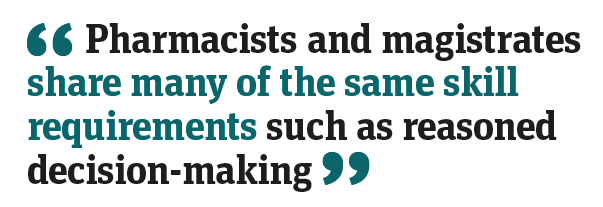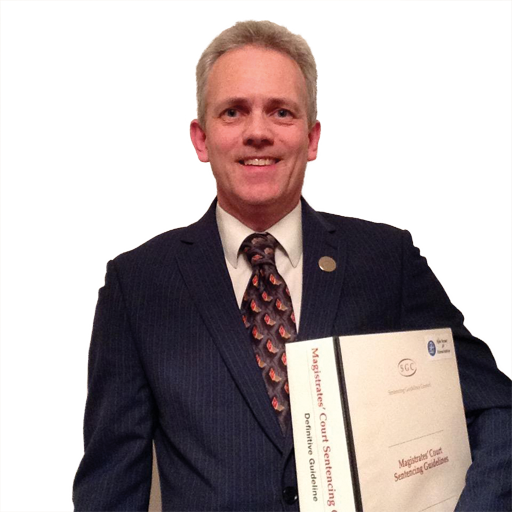Practice

Pharmacy profile: Holding court
In Practice
We know you want to continue to build on your practice, why not hear from others in the sector striving to do the same.Bookmark
Record learning outcomes
Kyle Brown is both pharmacist and store manager at Boots in Bedworth, Warwickshire. As if that’s not enough to keep him busy, he combines this with another community-focused role, sitting as a magistrate for Coventry and Warwickshire.

Growing up in Belfast during the Troubles in the 1970s, Kyle had his eye on a career in accountancy but, he says, “my favourite subjects were chemistry and biology, and a chance visit to a pharmacy with my grandmother to pick up her prescription was the trigger which changed my mind”.
After completing a pharmacy degree at Manchester University in 1985 with some vacational work each summer at Boots in Belfast, he accepted a preregistration placement with Boots in Leamington Spa.
“Although leaving family and moving permanently to England was a big step, I reckoned I would find greater opportunities on the mainland,” says Kyle, “so I decided to stay with Boots and began as a relief pharmacist based in Stratford-upon- Avon.”
A year later he was promoted to pharmacy manager at the large Northampton store, and by 1991 had relocated to a small store in Coventry as pharmacist store manager. “Since then I have worked in many Boots stores around the Midlands, including a year working on a radio-frequency technology project at our Nottingham Head Office.”
Community spirit
A spell in charge of an edge-oftown store made him realise he missed the atmosphere and community spirit of the smaller town shops, so he moved to the Bedworth branch where he says he’s been “happily working for over 10 years and thriving on the rapport I have built up with my regular customers”.
Nonetheless, in 2008 Kyle decided he needed a new challenge, and his deep-seated community spirit drew him in the direction of the magistracy.
All criminal prosecutions begin in the magistrates’ courts, with 95 per cent of cases resolved there. Only the most serious offences or ones where magistrates have insufficient powers are passed up to the Crown Court. The magistrate’s role is to apply the law in a fair and consistent manner through adjudicating at trials, sentencing those who plead guilty or are convicted, and authorising various types of warrants.
Contribution
“My application to become a magistrate was based on a number of factors,” Kyle explains, “one of which was a burglary at the pharmacy where the burglar was caught red-handed but in my opinion received a very lenient sentence. The other draw was that, because magistrates can work until they are 70, I saw it as something to do after retiring from pharmacy.”
Applicants are screened through a series of assessments and interviews, and chosen with diversity in mind so as to fairly represent the community as a whole. While no formal qualifications are needed to be a magistrate, training is provided and there are regular competency appraisals. The role is voluntary but magistrates are able to claim expenses for travelling to court.
Kyle was appointed a magistrate at the end of 2009 by Jack Straw – the then Lord Chancellor – and sworn in at Warwick Crown Court in March 2010. “We each have to commit to a minimum of 26 half-day court sittings each year, although in practice we average one to two full days per month,” he says. “I’m very lucky that my employer recognises the valuable contribution made by JPs and allows me one day per month away from work, with the rest done in my own time.”

Complementary competencies
Kyle finds it “fascinating work”, with many of the required competencies complementing those of his professional role. “Pharmacists and magistrates share many of the same skill requirements,” he says. “For example, being a good listener, reasoned decisionmaking, assertiveness and teamwork are all key competencies for both of my roles.”
However, being a magistrate is not for the faint-hearted, he warns. “We hear some gruesome and very sad stories along with some very ripe language, but there is definitely a feeling of satisfaction when justice is done and we take a common sense approach when applying the sentencing guidelines.”
One area where he sees a “huge overlap” between the roles involves substance misusers. “One day I will be helping some people with their methadone programmes and the next I will be sentencing others for criminal offences – although I do not sit on cases where defendants are known to me, as this could be seen as being biased.”
His pharmaceutical knowledge also comes in handy on cases where medication is used as an excuse. “On one occasion a defendant claimed his erratic behaviour was caused by his tablets, but unless he took the whole packet, I doubted senna would have been responsible!” he laughs.
Hugely rewarding In addition to his work in court, Kyle’s passion for the role has seen him visit local schools to give presentations about crime and its consequences as part of the ‘Magistrates in the community’ initiative. It is hugely rewarding to see how well young people respond to the message, he says, and even suggests it may be why crime rates amongst juveniles are falling.
Kyle says he “thoroughly enjoys” his dual roles and would recommend being a magistrate to anyone it appeals to. He acknowledges that the combination takes up a lot of his time, “but I’m not a sit-athome type of person. It feels good to take an active role in my local community, looking after people’s health, education and safety, and making our towns better to live, work and shop in.”

